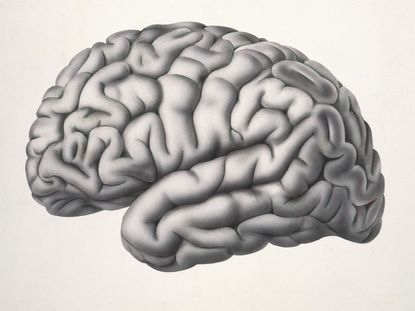11 Things You Can Do Right Now To Keep Your Brain In Tip-Top Condition
It’s often overlooked but our brain is responsible for everything single thing we do. Here’s how to keep it healthy.

It’s often overlooked but our brain is responsible for everything single thing we do. Here’s how to keep it healthy.
At the risk of sounding cliché, your brain is a muscle and like any muscle it needs exercising. You might think that using it all day every day is exercise enough, but the majority of what you do on a day-to-day basis is so routine, your brain barely taxes itself to do it.
The risk of developing cognitive illnesses like dementia and Alzheimer’s increase with age as our brains begin to atrophy or experience structural changes. In fact, when it comes to Alzheimer’s, the likelihood of developing the disease doubles every five years after the age of 65. But early onset Alzheimer’s (which applies to around one in 20 people with the condition) can affect people from around 40.
So much is being done in terms of research into preventing and treating illnesses that can affect our brain but some simple, everyday maintenance can go a long way in keeping everything ticking along nicely. Here are 11 brain boosting changes you can make right now.
1. Go Nuts For Nuts Snack on nuts – they help to lower blood pressure and the omega-3 found in walnuts have been shown to improve mood and calm inflammation in the brain that could otherwise lead to cells dying.
2. Move Yo’ Ass There really is something to be said for doing a little exercise to clear your head. Studies suggest that active students are more likely to test well than their more sedentary peers. Research shows that exercise boosts blood flow, which helps oxygen get around your body, which aids cognition. Easy.
3. Learn To Chill I know, avoiding stress is easier said than done, but neuroscientists at the University of California, Berkeley, have shown that chronic stress and the hormone cortisol (which is produced when you are stressed) can actually harm our brain. We’re not talking inconsequential changes either; It has long been acknowledged that illnesses such as post-traumatic stress disorder, or PTSD, can be a catalyst for structural changes in the brain including an imbalance between grey and white matter and even connectivity of the amygdala (the area in the brain that controls emotion), and it looks as though chronic stress can influence the brain in a similar way. The research into this continues but learning to relax a little won’t do you any harm. Do whatever it takes; learn to avoid stressful situations (good practice for all of us) and make time to switch off and do what you enjoy whether that’s soaking in a bath until your skin prunes or hitting the all you can eat brunch buffet with your pals.
Marie Claire Newsletter
Celebrity news, beauty, fashion advice, and fascinating features, delivered straight to your inbox!
4. Look Around It’s too easy to slip into a daze when all want to do is get from A-to-B but looking at your phone and ignoring your surroundings won’t be doing your brain any favours at all. Scanning your eyes from side-to-side can activate rarely used parts of the brain which your brain just loves because it inspires it to build new cells and neural connections. So get into the habit of really noticing your surroundings.
5. Constantly Challenge Yourself Learning something new encourages your brain to form new neural pathways. Which is only ever a good thing. Tackle new puzzles and games, learn a language, read a book on a topic you’re unfamiliar with, learn to dance or master a new craft. Once you have a handle on something your brain accepts it and it won’t use it as a stimulus for growth so opt for variety.
6. Reduce Your Salt Intake Evidence suggests that reducing sodium levels in your diet can improve blood flow to your brain and even reduce your risk of developing dementia.
7. Swap Hands Your handwriting will go downhill rapidly but using your non-dominant hand every now-and-then activates lesser used parts of the brain which stimulates growth.
8. Meditate Seriously, try it. Meditation reducing the stress hormone cortisol and has been shown to improve memory and soothe depression and anxiety. If you don’t fancy signing up for a class there are plenty of apps you can use to help you on your way to a more meditative state. We love HeadSpace which was developed by Andy Puddicombe, a mindfulness expert and former Tibetan Buddhist monk.
9. Eat Foods Containing Thiamine Thiamine (or Vitamin B1) is a nutrient that has been found to reduce a form of inflammation that can kill brain cells. You’ll find it in green peas, Brussels sprouts (if you can stomach them), pork, cabbage, lettuce, fish and seafood.
10. Try Porridge and Cinnamon For Brekkie In addition to being super tasty, oats literally de-scale our brain’s arteries of plaque while cinnamon improves neurotransmission by balancing blood sugar levels.
11. And Sleep! Sleep is vital for so many things and this includes keeping your brain as healthy as possible. Sleep not only consolidates memories and slows memory decline, but it allows your body to build vital proteins for your brain.
The leading destination for fashion, beauty, shopping and finger-on-the-pulse views on the latest issues. Marie Claire's travel content helps you delight in discovering new destinations around the globe, offering a unique – and sometimes unchartered – travel experience. From new hotel openings to the destinations tipped to take over our travel calendars, this iconic name has it covered.
-
 Taylor Swift has broken her silence on the meaning of new track ‘Clara Bow’
Taylor Swift has broken her silence on the meaning of new track ‘Clara Bow’By Jenny Proudfoot
-
 George, Charlotte and Louis are learning "new home rules" to help Princess Kate's recovery
George, Charlotte and Louis are learning "new home rules" to help Princess Kate's recoveryBy Jenny Proudfoot
-
 Hugh Grant just seemed to confirm a huge plot twist for Bridget Jones
Hugh Grant just seemed to confirm a huge plot twist for Bridget JonesGasp.
By Jadie Troy-Pryde